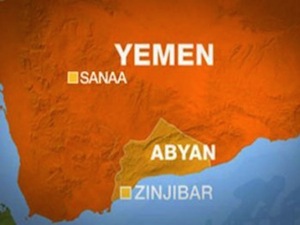Al-Qaeda in the Arabian Peninsula (AQAP) was among the most direct beneficiaries when Saudi Arabia launched its war against Yemen back in March, seizing the remote port city of al-Mukalla as a base of operations early on, as the Shi’ite Houthis were no longer able to target them, and the Saudis were simply unwilling.
 As the war has dragged on, AQAP has gotten bigger and bigger, and has now seized several more towns and cities, including the Abyan Provincial capital of Zinjibar and the nearby town of Jaar, both held by pro-Saudi forces and both evacuated when AQAP rolled in.
As the war has dragged on, AQAP has gotten bigger and bigger, and has now seized several more towns and cities, including the Abyan Provincial capital of Zinjibar and the nearby town of Jaar, both held by pro-Saudi forces and both evacuated when AQAP rolled in.
Pro-Saudi officials claimed they’d fought tooth and nail to keep AQAP out, but locals reported only a handful of deaths, and said AQAP arrived amid a virtually total absence of defenses. An AQAP allied faction, Ansar al-Shariah, controlled Abyan Province during the Arab Spring rebellions as well.
But AQAP getting direct control of cities is only part of the story, with the group also establishing a presence within Saudi-held territory, including in their “temporary capital” of Aden, where parts of the city regularly hold AQAP-run parades and Islamist factions operate with relative impunity.
Though the Saudi forces are still presenting the war as aiming to reinstall former President Hadi, who resigned in January, the war has overwhelmingly been couched in sectarian terms, Sunni states fighting the Shi’ites over Yemen. In that regard, it is perhaps unsurprising how ambivalent they’ve been about AQAP’s growth, as that group too is anti-Shi’ite, but when the war shakes out AQAP will have dramatically grown their power, and Hadi was struggling to contain them even when they were virtually land-less.


